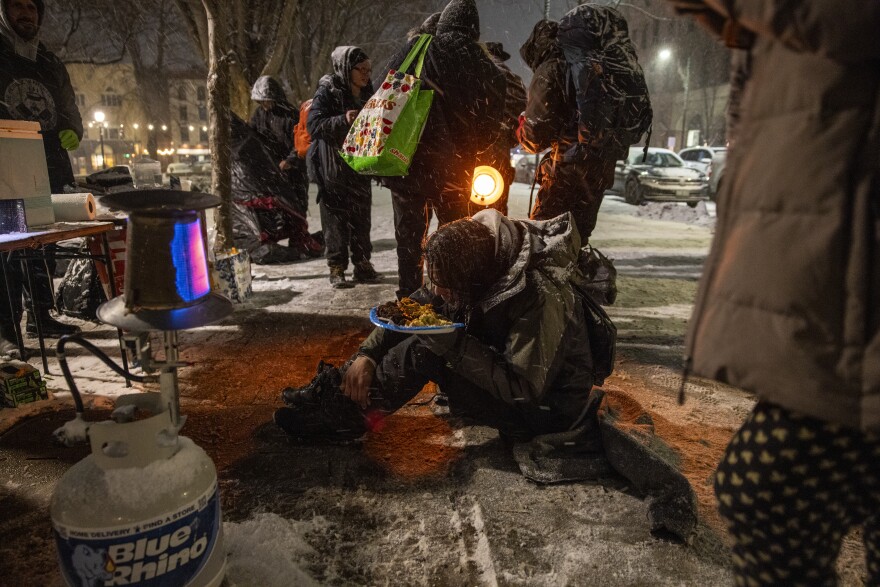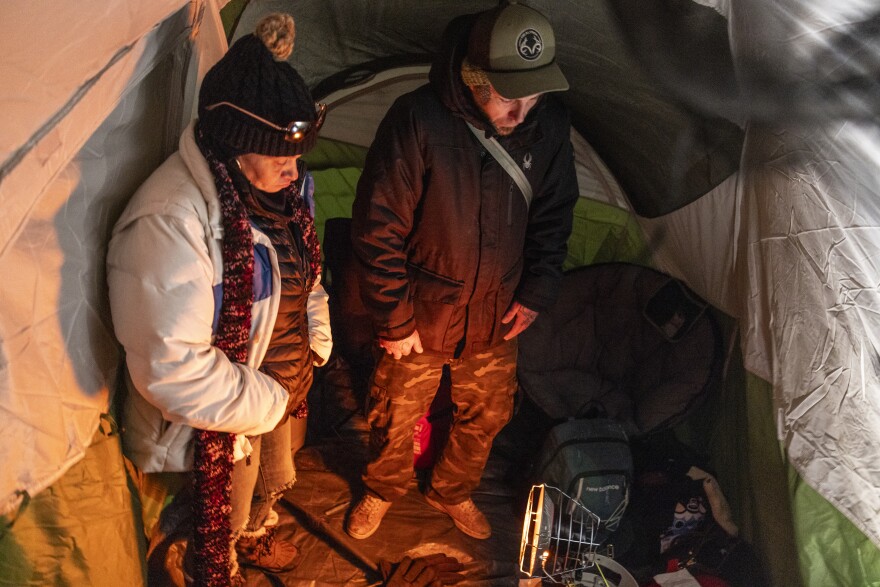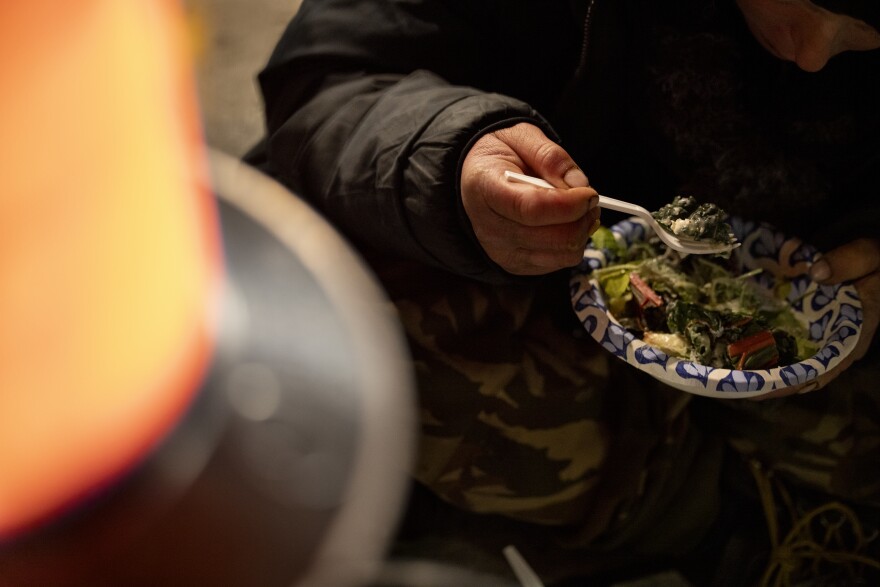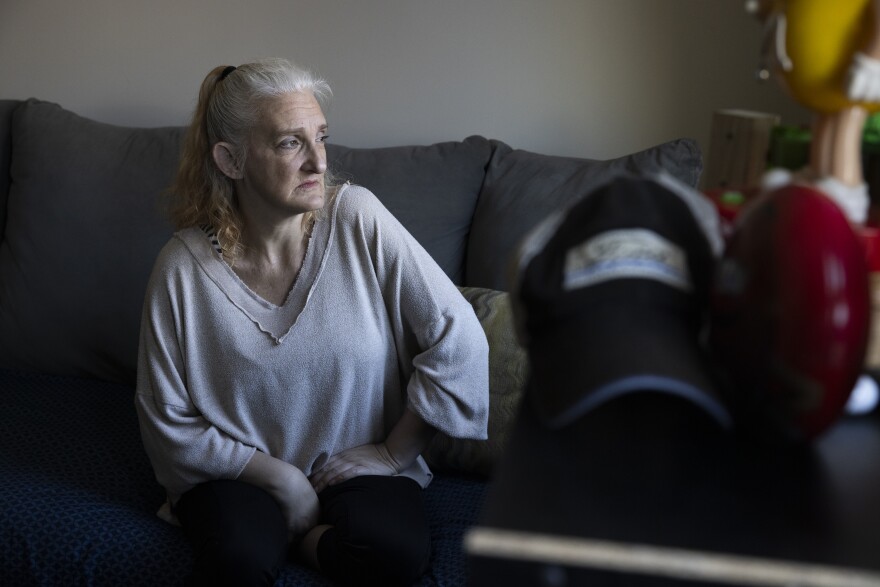This story was reported by �������� and . You can find a print version on newsstands through February 12.
Social workers Sarah Russell and Taylor Thibault stepped off the compact bus and set out on foot through downtown Burlington, searching for the homeless who hunkered in the folds of otherwise deserted streets.
A subzero windchill had pushed most city residents inside as midnight approached on January 21, one of the coldest nights this winter. Russell and Thibault's bus had 14 seats they could use to shuttle people to an emergency warming shelter the city had opened inside a gymnasium three miles away. The gym had space for 100 people, which a few years ago could have accommodated every unsheltered homeless person in Vermont. Not anymore.
Thibault rounded a corner and spotted two people sitting on a sidewalk, leaning against the brick wall of City Market amid a messy nest of blankets and bags of belongings. Thibault offered to drive the pair to the shelter, where they could eat, sleep and take a hot shower, no matter their state of sobriety. They accepted.
One block over, Russell approached a woman who stood in the alcove of a vacant office suite. But the woman was reluctant to venture across town to an unfamiliar place. She wanted a moment to mull it over.
"I'll be back, OK?" Russell said.
The city hired Russell in 2022 as its "special assistant to end homelessness," a goal that former mayor Miro Weinberger once aimed to achieve by the end of 2024. Today, an estimated 3,500 people live unhoused in Vermont, a record figure. The state ranks fourth in the nation for its rate of homelessness. In Chittenden County alone, more than 250 people are thought to be sleeping outside.
Now, for the second night in a row, Russell was on the hunt for unsheltered residents who might otherwise freeze to death.

The specter of hypothermia looms increasingly over the debate about how to respond to the state's homelessness problem. Without enough shelters, apartments or support services, advocates routinely argue that cuts to the $44-million-a-year program that has covered the cost of motel rooms for more than 5,000 people in the past six months would leave them for dead in the cold.
Exposure is just one of the perils facing homeless people. Their lives tend to be shorter than those of people who are impoverished but housed, a recent .
Like most states, Vermont does not keep track of how many homeless residents die or what kills them. Seven Days and �������� set out to count, for the first time, how many Vermonters have died while homeless during the past four years, by using death certificates, public obituaries, police reports, news accounts and interviews.
Hypothermia alone hasn't caused the deaths of any homeless Vermonters from 2021 through 2024, the news organizations found, though some 2024 death certificates are still being finalized. The state has provided wintertime shelter to as many as 95 percent of its homeless residents during that time, more than almost any other state.
Overall, the news organizations identified at least 82 people in Vermont who died between 2021 and 2024 while appearing to reside in an emergency shelter or outdoors. Homeless people perished in tents, sheds, motels and dumpsters. The leading cause of death among them was accidental drug overdose. Several people were hit by cars or died prematurely from health conditions exacerbated by their existences on the edge.
The unprecedented spending to provide motel rooms to homeless Vermonters during the pandemic is now being scaled back. As more Vermonters lack access to emergency shelters, efforts such as Russell's bus trips have taken on the hue of urgent, life-or-death stopgaps.
During their trawling, Russell and Thibault encountered Jesse Hillmann, a guitarist who busks on Church Street during the day and typically camps at night. With his guitar strapped to his back, Hillmann led the social workers into the Marketplace parking garage to help corral more riders. He tugged the handle to an interior stairwell, but it was locked among the measures the city has taken to curtail loitering and drug use.
So Hillmann called out to the wind, his words reverberating throughout the four-story matrix of concrete: "Anybody want to go to the warming shelter?"

'Without a place to rest my head'
Morristown police found Michael Mallen's body last April in a baseball equipment shed. He was curled on his right side by the door, stiffened from rigor mortis. There was a mattress near his body, along with a supply of food, clothes and piles of trash. Mallen wore several layers of shirts, and his hand gripped a crack pipe. An autopsy would later determine that he had fatally overdosed on fentanyl, cocaine, trazodone and clonazepam. He was 45.
Morristown Police Chief Jason Luneau arrived at the shed after dark. He'd known Mallen, a local who had spent years in and out of prison and struggled with addiction. But the chief had no idea he'd been living in a shed.
Luneau pulled Mallen's wallet from his jeans pocket and found a handwritten note addressed to Vermont Probation and Parole. In it, Mallen had written that he was unable to get an emergency motel room through the state's program because, he had been told, he qualified only on especially cold winter nights.
Mallen had asked that a Probation and Parole supervisor "glance" at the note, because he saw himself as an example of a "severely broken" system that doesn't do enough to help former inmates get back on their feet. Two years removed from his last stint in prison, Mallen was without a "place to rest my head at night nor call home," he wrote.
"Sorry," he added. "I'm fucking disgusted." The note was dated April 15, four days before his body was found.
Luneau said in an interview that the note echoed what he's observed: The system "sets some of these people up to fail."
Mallen's death certificate includes the medical examiner's determination that his death was accidental. His address was left blank, and his town of residence is listed as "unknown."
Mallen is not among the 25 Vermonters who were explicitly identified as homeless on their death certificates in the past four years. The physicians and medical examiners who complete the forms are not charged with investigating a decedent's housing status, so the record keeping is unreliable.
Seven Days and �������� used other clues on the forms, in addition to follow-up reporting, to identify Mallen and the 81 others who were said to have been unsheltered or staying in an emergency motel at their time of death. That figure likely does not include every homeless Vermonter who died in recent years. But an examination of their circumstances provides a glimpse of the hazards they face.
Efforts to tally deaths among homeless people in the U.S. are few and inconsistent. Academic researchers have suggested that states could compile better information by matching death certificates with confidential client records from local homeless service providers �� something Vermont could do but has not attempted.
Such an effort could be worthwhile, Vermont Health Commissioner Dr. Mark Levine said, though collecting reliable data would be "very challenging."
Accidental drug overdose, such as Mallen's, is the leading cause of death among the homeless Vermonters, Seven Days and �������� were able to identify. The finding mirrors research in other states and lines up with data from the Vermont Department of Health. The all 231 fatal overdoses in 2021 and found that 49 of those people had received some kind of homelessness-related service during the six months before their death.
The link between homelessness and addiction is close and complex, experts say. Addiction can drive a person toward homelessness; being unhoused can lead to or perpetuate drug use.

Homeless Vermonters have overdosed in all types of living environments. More than 20 have died at motels that received funds from the state's emergency program. A 50-year-old man died in January 2024 in a relative's backyard shed in Winooski, where he and his wife had been staying. His widow, 47, died of an overdose three days later at a homeless encampment in Burlington's Intervale.
Like Mallen, another homeless man, Todd Gorton, struggled to find housing upon his 2022 release from prison. He was unable to secure an apartment, a task made more difficult because he had been designated by the state as a "high-risk" sex offender.
"I have no renter history," he told a �������� reporter in 2021 while awaiting his release. "I've never had a credit card, I've never had nothing - nothing but jail. Fucking sad. I can't believe I've made it this long."
Gorton eventually landed a spot in the emergency "pods" on Elmwood Avenue in Burlington, where he told a �������� reporter a year ago that he was "doing better." He was scared of the potent street drugs he was using to cope with his stress and despair, Gorton said at the time, but was also treating his opioid addiction with the medication Suboxone.
Less than two weeks later, Gorton overdosed and died inside his 60-square-foot pod. He was 54.
'The magic school bus!'
Within 10 minutes, Russell and Thibault had filled every seat on the bus borrowed from the Department of Parks, Recreation & Waterfront.
"It's the magic school bus!" a young man called out from the front row.
Russell pressed a button to close the folding doors, and the little white coach rolled toward the Robert Miller Community and Recreation Center in the city's New North End.
During the ride, the young man in front told Russell that he had slept in a parked car the previous night. He stayed warm by connecting a small electric heater to an outlet on the side of an apartment building. The pirated setup worked for a time.
"At six o'clock in the morning, someone got mad and unplugged it and threw the cord in my car," he said.
"It was so cold last night," Russell replied.
"It was brutal," the man said.

The city has opened an extreme cold-weather shelter just a handful of times since 2023 and only when especially dangerous low temperatures are forecast. City employees and those from nonprofit social service organizations work late-night, overtime shifts to keep guests safe and administer overdose-reversing drugs as needed. Russell decided to employ the shuttle strategy to reach more people during a three-day cold snap in late January, when Burlington temps plunged as low as 1 degree Fahrenheit. It was Russell's second night driving the "magic" bus.
Mayor Emma Mulvaney-Stanak's administration has opened the emergency shelter for three short stints since December, even though temperatures didn't reach the minus 20-degree windchill that the state considers the necessary threshold. So far, state officials have nonetheless agreed to foot the bill.
The shelter amounts to an "emergency response," Russell said, that wasn't necessary when the state provided wintertime motel rooms to virtually all homeless residents whom existing shelters couldn't accommodate. Since then, state lawmakers, at Gov. Phil Scott's urging, have begun to scale back the program. Federal aid had allowed the state to expand it during the pandemic, but the aid has since dried up, and homelessness has continued to increase.
The wintertime motel program began in 2012 under Democratic governor Peter Shumlin. Its creation followed the death of a homeless Burlington man named Paul O'Toole. He had been found dead over a heating grate on a downtown street, though his cause of death was later determined to be a drug overdose, according to .
The cold-weather motel program has been criticized as financially untenable almost since its inception. But it has helped prevent deaths from hypothermia in recent years.

The 82 recorded deaths of homeless people reviewed for this story did not include any that were attributed to exposure alone. Advocates, however, say that many unhoused people suffer exposure-related injuries and health effects that are more difficult to measure, and naming a specific cause of death can be elusive.
In one such case, a man named Travis Young died in December 2021 while lying in a "makeshift cot inside a manmade teepee" in the woods of Westminster. Young was 51. His body had no signs of injury nor intoxication. Acquaintances hadn't seen him for weeks.
"Although outdoors in cold weather, there are no findings to confirm a death by hypothermia," the state medical examiner who completed Young's autopsy wrote. "The cause of death is certified as undetermined."
The news organizations did find one instance in the death files when cold weather was deemed to have contributed to a homeless person's death. Ken Davis, a 58-year-old Burlington man, was discovered inside a downtown parking garage just before dawn in December 2022. Davis, according to police reports, was sitting in a wheelchair, covered in blankets. His lips and hands were blue.
Just weeks earlier, Davis had been quoted in a in the New York Times that brought the Queen City's urban ills to a national audience. Davis had told the Times that he slept in City Hall Park and had been spooked by a recent experience trying methamphetamine, which then was relatively new to Vermont's streets.
His death was ruled accidental, due to complications from fentanyl intoxication. Also contributing to Davis' death, the state medical examiner wrote, was hypothermia "due to environmental exposure."

In their bus, Russell and Thibault worried about similar cases in the arctic cold and decided to continue their search. They unloaded the 14 riders at the shelter, then headed back downtown for a second trip.
The pair stopped at the waterfront, where numerous campers have pitched tents in highly visible locations, unlike in prior winters. They walked up to a cluster of compact, dome-style tents behind the Moran Frame, nestled against the Lake Champlain shoreline. Personal belongings were stashed in wheeled carts alongside them. Extension cords connected generators to unseen appliances inside some of the shelters.
The icy wind gnawed into any exposed area of skin and pummeled the tents' polyester sides.
Russell yelled into the frigid darkness. "Hello! Is anyone down here?"
She went from tent to tent but heard no response. She noticed a light on inside one of them. Russell called out again, shook the tent. Silence.
She and Thibault gave each other anxious looks. Russell crouched and addressed whoever might be inside. "I'm worried about you," she spoke into the flimsy fabric.
Then she pulled the zipper and opened the flap just long enough to see a pile of blankets, some plastic drawers and an electric lamp.
Whoever slept there was gone. They'd just left the light on.
'Running'
Jessica Barrows loved Sean Kelleher for his good looks and the way he sometimes talked to her in cartoonish voices. She loved listening to him sing along to his favorite song, the Shinedown cover of Lynyrd Skynyrd's "Simple Man," and watching movies with him in her living room, where they'd sometimes drag the futon mattress and flop for the whole day. Barrows loved that Kelleher shared her dream of someday traveling to a place beyond New England, to know what else is "out there."
Barrows, 48, also knew that Kelleher was an alcoholic and that he had weathered a fractured upbringing in Burlington's Old North End.
Beginning when he was a teenager, Kelleher had cycled between prison and homelessness enough times that it became a way of life. By his late forties, while Kelleher and Barrows were dating, Kelleher made efforts to get sober, but he would sometimes abandon the comfort of her Hinesburg apartment for weeks at a time to live on the streets of Burlington. Barrows called it "running."
During those difficult periods, nightmares disrupted her sleep. Once she dreamed that Kelleher had overdosed. Another time her mind conjured images of her partner freezing to death outside.

She couldn't have imagined what actually happened to him.
In June 2023, following an argument, Kelleher and Barrows separated at the bus terminal in downtown Burlington. Barrows didn't hear from Kelleher for nearly a week. Then, to her horror, she saw the story on the morning news.
Kelleher's body had been discovered a few days earlier on a conveyor belt at the Casella facility in Williston that is used to sort recycling. He was disfigured from the crushing force of a recycling truck, which pointed to the likelihood that he had been scooped up when a driver loaded a dumpster filled with cardboard and plastic. Williston police had been able to identify Kelleher, 50, using his tattoos, but they couldn't find any next of kin. So they broadcast his name on the news.
"It said, 'Sean Kelle-,' and I didn't hear the rest," Barrows said.
Kelleher was one of three homeless people whose bodies were discovered at recycling facilities in 2023, according to state death certificates. Kelleher and a 67-year-old Rutland man both died during the summer months. Jessica Morehouse, a 34-year-old mother of three, was crushed to death that January after sleeping in a White River Junction dumpster, the Valley News reported.
Before Kelleher's death, Barrows had been holding on to hope that Kelleher, who called himself her husband even though they were not officially married, might overcome his destructive tendencies. She kept a video she had recorded on her cellphone of Kelleher pouring out cans of malt liquor into her sink during a moment of resolve.
Barrows, too, had been homeless and struggled with addiction. Nearly 15 years ago, however, she found help through a supportive housing program. She got the apartment in Hinesburg and met weekly with a case manager. Barrows also saw a therapist. That combination of support, a model known as "housing first," and perseverance helped Barrows achieve a stability that had eluded her for much of her life.
"It helped me move away from the crowd of people I didn't want to be around anymore," she said.
Barrows began using drugs again in the months after Kelleher's sudden death. She fell behind on her bills, until the possibility of losing her hard-earned apartment began to feel real. After four or five months of focused effort, she got her finances back on track.
"Something woke me up," she said.
Williston police never determined exactly how Kelleher ended up at the recycling center; they never traced his path back to a particular dumpster. Kelleher was crushed to death, according to the medical examiner, but the investigation failed to determine if his death was accidental.
Kelleher left behind two children, including 29-year-old Marissa, who also learned of his death on television. Marissa's father was not present for much of her life, but today she is reflective about his struggles. Sean's mother had abandoned him when he was young, Marissa said. His father had been homeless, too.
"He didn't have the tools he needed to become an actual citizen that could amount to something," she said.
Marissa Kelleher held a memorial for her father about a month after he died. She invited only some family and one of Sean's close friends. They brought his ashes to the Burlington waterfront, then dropped off care packages to a local homeless shelter.
The State of Vermont covered some of the cremation costs, Marissa said, through a program intended to provide dignified burials for the indigent.
Final stop
On their final shuttle run, Russell and Thibault picked up three more people, which would bring the total number of shelter guests to 82.
The city managed to draw 30 more people to the shelter on this night than the previous one. Officials had sought to get word out by posting fliers at the Fletcher Free Library and other locations where homeless people spend time. Before its late-night runs, the magic bus had also made two dinnertime pickups at the library and the community resource center in the Old North End.

The outreach seemed to help. So did patience. During a December cold snap, Thibault said she met a couple who were planning to sleep on a bed they'd constructed using hand warmers. They declined to go to the city's emergency shelter that night, citing bad experiences at other shelters. Thibault gave them cigarettes and wished them well. This time around, the couple took up Thibault on her offer. They thanked her, too.
The night before, Thibault said, she had met one man who was staying inside a "makeshift igloo" assembled of cardboard and garbage bags; Thibault's mittens were still flecked with bits of lettuce that the man had been eating as a snack. As Russell drove along Pearl Street on this night, Thibault called out to another woman, known as the "fort queen," who was sleeping in an office building alcove. The woman lifted her head from an assemblage of cardboard, office furniture and tree limbs and said she was going to stay put for the night.
Russell and Thibault could not reach everyone, but they could reach some, and, for tonight, they accepted that as enough. Despondency has started to ail many who work with homeless and other vulnerable people in Vermont. Service agencies are pushed beyond their limit, while public support for their cause seems to be flagging amid a rise in petty crime, a proliferation of encampments and a looming sense of disorder.
No one argues that the extreme-weather shelter and magic school bus are long-term solutions. But to those waging a Sisyphean struggle, they at least felt tangible. "It drives me to be like, 'OK, we have work to do,'" Russell said.
On the way back to the shelter, well after midnight, Russell stopped the bus next to Battery Park. She got out and carried water over to the illuminated concrete band shell, where a man she knew lay beneath a sprawling pile of sleeping bags and blankets.
"I brought back water for you," Russell said. "Are you sure I can't get you to come with me?"
The man shook her off.
"I'm gonna come out and check on you again tomorrow night, OK? Can I bring you something you want?" she pressed. "What would make your day?"
The man's hands were bare. "Gloves," he told her.
Back on the idling bus, a young man in the back seat was growing impatient. His face was marked with tattoos, and he was woefully underdressed for the conditions.
"Can we get going?" he urged Thibault, then apologized for his sharp tone. "It's cold, is all."
Have questions, comments or tips? .
Enter your email to sign up for The Frequency
��������'s daily news update, sent weekday mornings.





